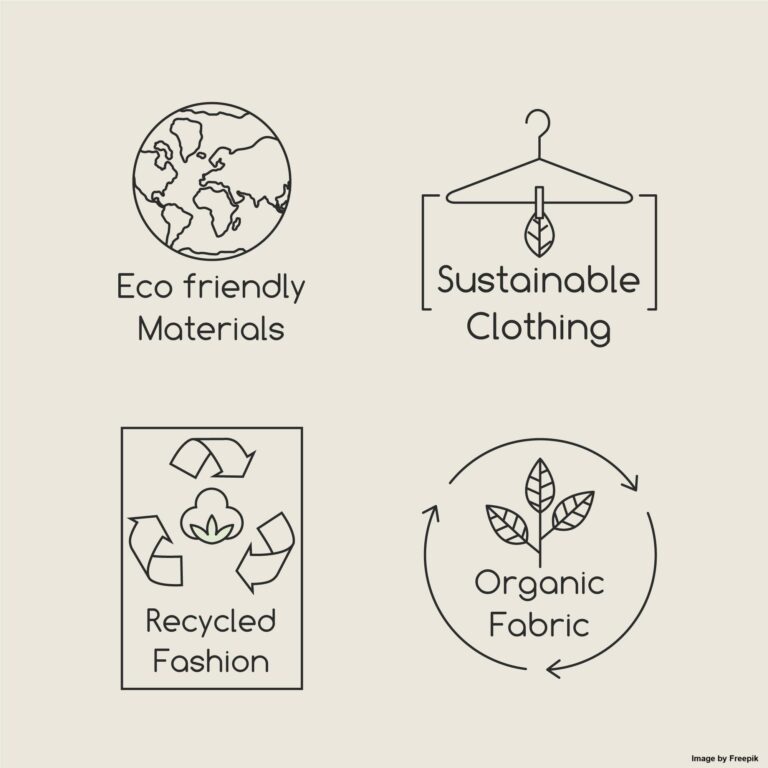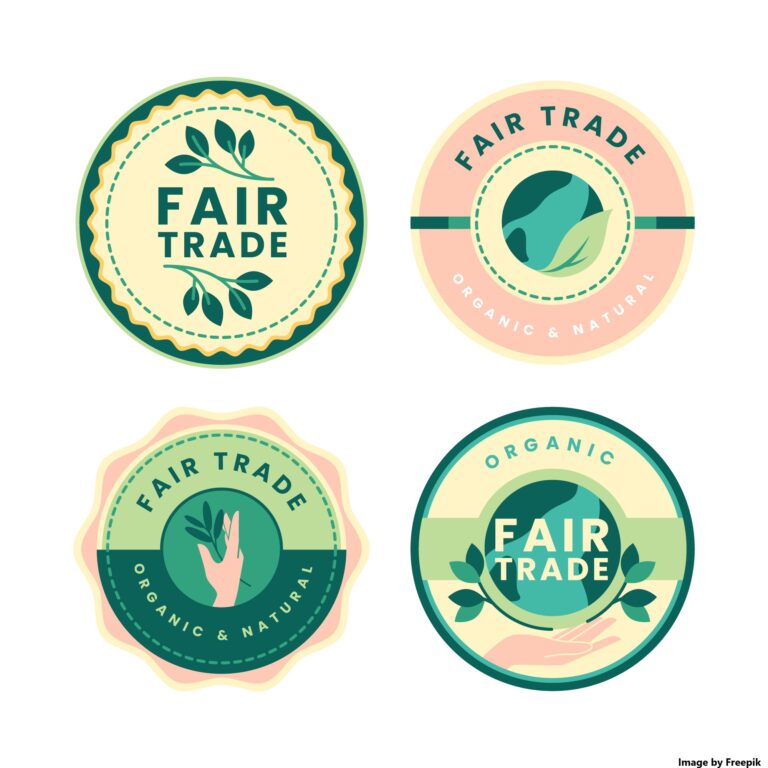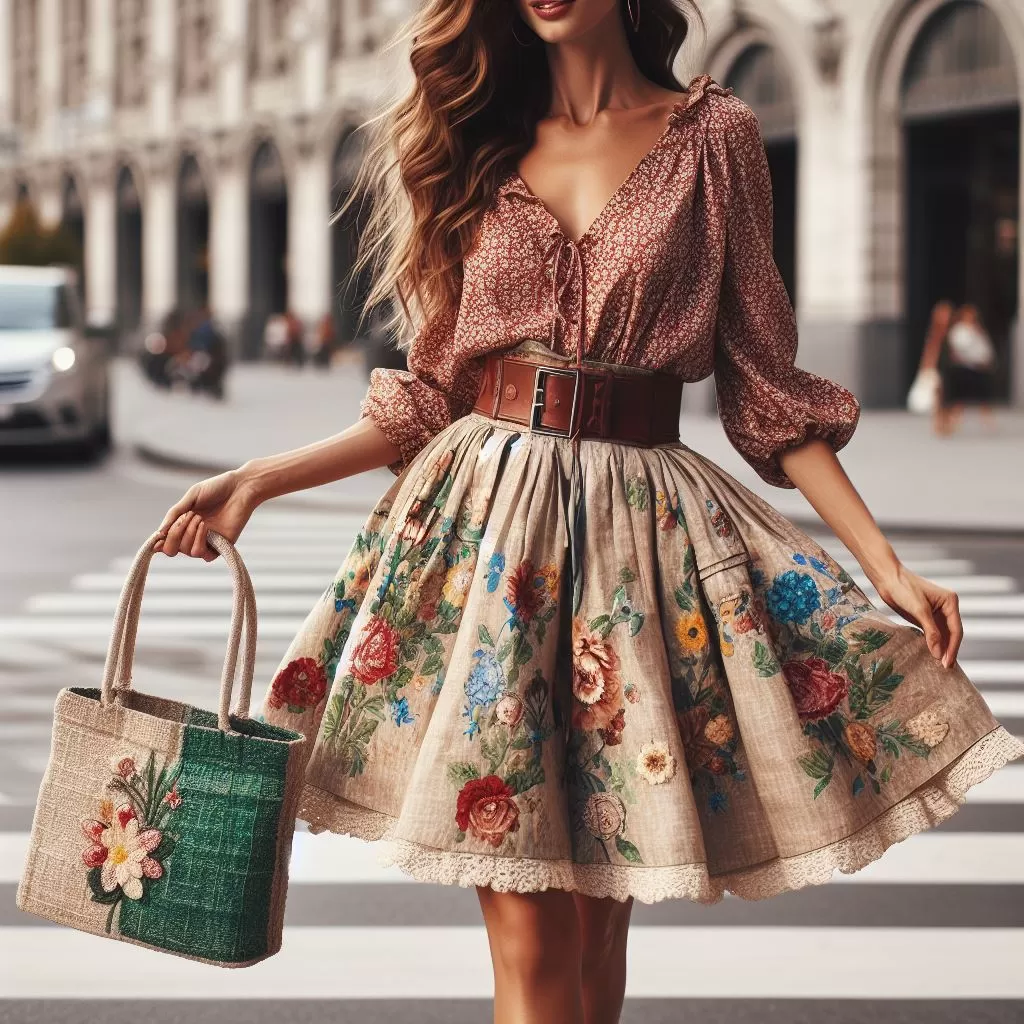We know that understanding sustainable fashion can feel a bit overwhelming at times, especially with all the different terms and practices out there. But don’t worry—we’ve got you covered. That’s why we’ve put together this handy guide, breaking down the essential eco-friendly fashion terms everyone should know. By the end of this, you’ll feel more confident and informed when making conscious choices as an eco-shopper. Let’s dive right in!

Jump To:
Toggle
Eco-Friendly Fashion Materials
Sustainable fashion relies on materials that significantly reduce environmental impact. These 10 eco-friendly materials set the standard:
1. Organic Cotton
- Definition: Cotton grown without synthetic pesticides or fertilizers.
- Why It Matters: Organic cotton is gentler on the environment and safer for farmers.
2. Recycled Polyester
- Definition: Polyester made from recycled plastic bottles or textiles.
- Why It Matters: It reduces plastic waste and the need for new polyester production.
3. Bamboo Viscose
- Definition: A soft fabric made from bamboo pulp.
- Why It Matters: Bamboo grows quickly without pesticides, making it an eco-friendly option
4. Hemp
- Definition: A durable fiber requiring minimal water and no pesticides.
- Why It Matters: Hemp is versatile and has a low environmental impact.
5. Tencel/Lyocell
- Definition: A fiber made from sustainably sourced wood pulp.
- Why It Matters: Tencel uses less water and is biodegradable.
6. Cork
- Definition: A renewable material harvested from the bark of cork oak trees.
- Why It Matters: Harvesting cork doesn’t harm the trees, making it sustainable.
7. Piñatex
- Definition: A leather alternative made from pineapple leaf fibers.
- Why It Matters: It offers a use for pineapple waste and provides an eco-friendly leather substitute.
8. Econyl
- Definition: Regenerated nylon made from waste materials like fishing nets.
- Why It Matters: It reduces ocean waste and the need for new nylon.
9. Linen
- Definition: Made from flax plants, requiring minimal water and pesticides.
- Why It Matters: Linen is durable, biodegradable, and eco-friendly.
10. Recycled Wool
- Definition: Wool reclaimed from pre- or post-consumer sources.
- Why It Matters: It reduces waste and the demand for new wool.

Certifications in Eco-Friendly Fashion
Certifications help consumers identify products that are truly sustainable. Here are 10 certifications to know:
1. Fair Trade
- Definition: Ensures fair wages and ethical working conditions.
- Why It Matters: It supports workers and farmers in developing countries.
2. GOTS (Global Organic Textile Standard)
- Definition: A certification for organic textiles covering environmental and social criteria.
- Why It Matters: Guarantees that textiles meet strict organic and ethical standards.
3. OEKO-TEX
- Definition: Certifies that textiles are free from harmful chemicals.
- Why It Matters: Ensures safety for consumers and the environment.
4. Bluesign®
- Definition: Focuses on minimizing the environmental impact of the entire textile supply chain.
- Why It Matters: Promotes safer and more sustainable manufacturing.
5. Cradle to Cradle Certified™
- Definition: Evaluates products for environmental and social performance throughout their lifecycle.
- Why It Matters: Encourages products designed for a circular economy.
6. PETA-Approved Vegan
- Definition: Certifies that no animal-derived materials were used.
- Why It Matters: Supports animal welfare and cruelty-free products.
7. B Corp Certification
- Definition: Awarded to companies meeting high standards of social and environmental performance.
- Why It Matters: Indicates a company’s commitment to sustainability and social responsibility.
8. Fair Wear Foundation (FWF)
- Definition: Works to improve labor conditions in the textile industry.
- Why It Matters: Promotes fair treatment of garment workers.
9. Forest Stewardship Council (FSC)
- Definition: Certifies that materials like wood come from responsibly managed forests.
- Why It Matters: Supports sustainable forestry practices.
10. Responsible Wool Standard (RWS)
- Definition: Ensures wool comes from farms with high animal welfare standards.
- Why It Matters: Promotes ethical wool production.
Sustainable Fashion Practices
Sustainable fashion goes beyond just materials and certifications—it’s about embracing mindful practices too.
1. Slow Fashion
- Definition: Emphasizes quality, timeless designs, and ethical production.
- Why It Matters: Encourages a more mindful approach to buying and wearing clothes.
2. Circular Fashion
- Definition: Circular Fashion focuses on recycling and reusing materials to keep them in use as long as possible.
- Why It Matters: Minimizes waste and promotes a sustainable product lifecycle.
3. Upcycling
- Definition: Turns old or discarded items into new, improved products.
- Why It Matters: Reduces waste and gives new life to unused materials.
4. Zero Waste
- Definition: Producing and consuming products in a way that generates little to no waste.
- Why It Matters: Helps conserve natural resources and reduce pollution.
5. Ethical Fashion
- Definition: Focuses on fair labor practices, animal welfare, and minimizing environmental impact.
- Why It Matters: Ensures that fashion production respects both people and the planet.
6. Carbon Neutral
- Definition: Balancing carbon emissions to achieve a net-zero carbon footprint.
- Why It Matters: Supports efforts to combat climate change.
7. Transparency
- Definition: Brands openly share information about their production processes.
- Why It Matters: Allows consumers to make informed, ethical choices.
8. Eco-Conscious Design
- Definition: Designing products with the environment in mind, from material sourcing to end-of-life disposal.
- Why It Matters: Reduces the environmental footprint of fashion products.
9. Local Production
- Definition: Producing goods locally to reduce transportation emissions and support local economies.
- Why It Matters: Helps reduce the carbon footprint and supports community growth.
10. Durability
- Definition: Creating products designed to last longer, reducing the need for frequent replacements.
- Why It Matters: Encourages a shift away from disposable fashion.

Fashion Pitfalls
While there are many sustainable practices, some aspects of the fashion industry negatively impact the environment and society. Here’s why you should care:
1. Greenwashing
- Definition: Greenwashing is where brands making false or misleading claims about being eco-friendly.
- Why You Should Care: It misleads consumers and hinders true sustainability efforts.
2. Fast Fashion
- Definition: Rapid production of cheap, trendy clothing, often compromising quality and ethics.
- Why You Should Care: It leads to overconsumption, waste, and poor labor practices.
3. Ultra-Fast Fashion
- Definition: An extreme version of fast fashion, with even faster production cycles.
- Why You Should Care: It results in more waste and environmental harm.
4. Synthetic Microfibers
- Definition: Tiny fibers shed from synthetic clothing during washing, polluting waterways.
- Why You Should Care: It contributes to microplastic pollution, harming marine life.
5. Overproduction
- Definition: Producing more clothing than can be sold, leading to excess waste.
- Why You Should Care: It contributes to environmental pollution and resource depletion.
6. Disposable Fashion
- Definition: Clothing designed for short-term use, often resulting in quick disposal.
- Why You Should Care: It encourages a throwaway culture and adds to landfill waste.
7. Poor Labor Practices
- Definition: Exploitative working conditions, often in fast fashion factories.
- Why You Should Care: It violates workers’ rights and perpetuates social inequality.
8. Toxic Dyes
- Definition: Using dyes that release harmful chemicals into water systems.
- Why You Should Care: It pollutes water sources and affects the health of nearby communities.
9. Unsustainable Sourcing
- Definition: Using materials that are not responsibly or sustainably sourced.
- Why You Should Care: It harms ecosystems and contributes to deforestation.
10. Lack of Transparency
- Definition: Brands not disclosing their production practices or supply chain.
- Why You Should Care: It makes it difficult for consumers to make informed, ethical choices.
Conclusion
Understanding these eco-friendly fashion terms empowers you to make more informed and sustainable choices. By knowing the materials, certifications, practices, and pitfalls, you can support brands that align with your values and contribute to a more sustainable fashion industry.



